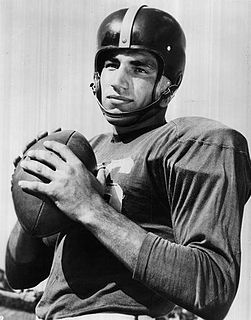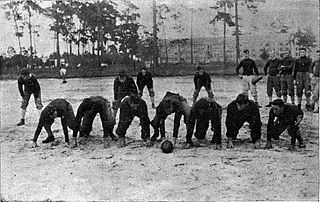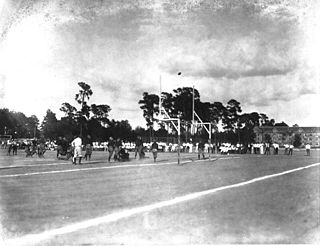Related Research Articles

Richard Jose Casares was an American college and professional football player who was a fullback in the National Football League (NFL) and American Football League (AFL) for twelve seasons during the 1950s and 1960s. Casares played college football for the University of Florida, where he was standout fullback and kicker. Casares played professionally for the Chicago Bears and Washington Redskins of the NFL, and was a member of the expansion Miami Dolphins of the AFL.

The Florida Gators football program represents the University of Florida (UF) in American college football. Florida competes in the Football Bowl Subdivision (FBS) of the National Collegiate Athletic Association (NCAA) and the Eastern Division of the Southeastern Conference (SEC). They play their home games in Steve Spurrier-Florida Field at Ben Hill Griffin Stadium on the university's Gainesville campus.
John Broward "Brad" Culpepper is an American former professional football player who was a defensive tackle in the National Football League (NFL) for nine seasons during the 1990s and early 2000s. Culpepper was as an All-American when he played college football for the Florida Gators. Selected late in the tenth round of the 1992 NFL Draft, he became a consistent starter for the Minnesota Vikings, Tampa Bay Buccaneers, and Chicago Bears.
Kerwin Douglas Bell is an American football coach and former player who is currently the Head Coach of the Western Carolina Catamounts football team. Bell was born in the North Central Florida town of Live Oak and was a star high school football quarterback at Lafayette County High School in nearby Mayo, Florida. Bell did not attract the attention of top college football programs while playing at the small high school, so he decided to attend the University of Florida in nearby Gainesville and joined the Gators as a walk-on.

The Florida–Florida State football rivalry is an American college football rivalry between the teams of the two oldest public universities of the U.S. state of Florida: the University of Florida Gators and Florida State University Seminoles. Both universities participate in a range of intercollegiate sports, and for the last several years, the Florida Department of Agriculture and Consumer Services has sponsored a "Sunshine Showdown" promotion that tallies the total number of wins for each school in head-to-head sports competition. However, the annual football game between the Gators and Seminoles has consistently been the most intense and notable competition between the in-state rivals.

The 1912 Florida Gators football team represented the University of Florida during the 1912 college football season. The season was the fourth for George Pyle as the Florida Gators football team's head coach. Pyle's 1912 Florida Gators finished their seventh varsity football season with an SIAA conference record of 1–2 and an overall winning record of 5–2–1.
Thomas Johnson "John" Reaves was an American college and professional football player who was a quarterback for eleven seasons in the National Football League (NFL) and three seasons in the United States Football League (USFL) during the 1970s and 1980s. Reaves played college football for the University of Florida, and earned All-American honors. He was a first-round pick in the 1972 NFL Draft, and played professionally for the Philadelphia Eagles, Cincinnati Bengals, Minnesota Vikings, Houston Oilers, and Tampa Bay Buccaneers of the NFL, and the Tampa Bay Bandits of the USFL.

William Lawrence Smith is an American former college and professional football player who was a running back in the National Football League (NFL) for six seasons during the 1960s and 1970s. Smith played college football for the University of Florida, and earned All-American honors. He was a first-round pick in the 1969 NFL Draft, and played professionally for the Los Angeles Rams and Washington Redskins of the NFL.

The 1924 Florida Gators football team represented the University of Florida during the 1924 Southern Conference football season. This was Major James Van Fleet's second and final year as the head coach of the Florida Gators football team. Van Fleet's 1924 Florida Gators finished 6–2–2 overall, and 2–0–1 in the Southern Conference, placing second of twenty-two teams in the conference standings.
The 1941 Florida Gators football team was an American football team that represented the University of Florida in the Southeastern Conference (SEC) during the 1941 college football season. In their second season under head coach Tom Lieb, the Gators compiled a 4–6 record and outscored opponents by a total of 149 to 97. The team played its home games at Florida Field in Gainesville, Florida. The season's highlights included a 14–0 road win over the Miami Hurricanes and a 14–7 homecoming victory over Georgia Tech.
The 1946 Florida Gators football team was an American football team that represented the University of Florida in the Southeastern Conference (SEC) during the 1946 college football season. In their first season under head coach Raymond Wolf, the Gators compiled a 0–9 record, finished last in the SEC, and were outscored by a total of 264 to 104.

The 1966 Florida Gators football team represented the University of Florida in the sport of American football during the 1966 NCAA University Division football season. The Gators competed in the University Division of the National Collegiate Athletic Association (NCAA) and the Southeastern Conference (SEC). In their seventh season under head coach Ray Graves, the Gators compiled a 9–2 overall win–loss record, finished 5–1 and placed third among the SEC's ten teams. Led by quarterback Steve Spurrier, the Gators outscored their opponents by a combined total of 265 to 147 and concluded their 1966 season with a 27–12 victory over the Georgia Tech Yellow Jackets in the 1967 Orange Bowl. The Gators were not ranked in the final AP Poll, but finished No. 11 in the final UPI Coaches Poll.

James Adger "Jack" Forsythe Jr., nicknamed "Pee Wee" Forsythe, was an American college football player and coach. Forsythe has an important place in the history of college athletics in the U.S. state of Florida as the first head coach of the team now known as the University of Florida Gators. He had previously been the last football coach at Florida State College, now Florida State University, before it was reorganized as a school for women.
Lynn Otto Matthews is an American former college football player who was recognized as an All-American. Matthews later became a newspaper publishing executive.
The 1906 Florida football team was the first intercollegeate football squad fielded by the University of Florida, which was established in 1905 and opened its new Gainesville campus for the 1906–1907 academic year. Florida was a member of the Intercollegiate Athletic Association of the United States (IAAUS) but was not yet affiliated with an athletic conference. The university had not yet constructed on-campus sports facilities, so until 1911, its football and baseball teams played and practiced at a municipal park near downtown Gainesville known simply as The Ballpark.

Robert Dee "Ark" Newton, Jr. was an American college football player for the Florida Gators football team of the University of Florida. Newton was also a member of the Florida Gators baseball, basketball and track teams.

The 1903 Florida State College football team represented Florida State College in the sport of American football during the 1903 college football season. The team was led by head coach W.W. Hughes and posted a 3–2–1 record and won a claim to the State Championship. With no formal nickname or mascot, the Florida State College football team was known simply as the "Florida State College Eleven".
Ion Sessions "Speedy" Walker was a college football and basketball player for the Florida Gators. He served in the Army in World War 2.
The history of Florida Gators football began in 1906, when the newly established "University of the State of Florida" fielded a football team during its first full academic year of existence. The school's name was shortened to the University of Florida in 1908, and the football team gained the nickname "Gators" in 1911. The program started small, usually playing six to eight games per season against small colleges and local athletic club teams in north Florida and south Georgia. The Orange and Blue developed early rivalries with the Stetson Hatters from nearby Deland and Mercer Bears from Macon. During the 1910s, Florida began playing a wider range of opponents from more established football programs across the southeastern United States and faced off against several future rivals - such as Georgia, Georgia Tech, South Carolina, and Auburn - for the first time.
The 1903 Tampa football team represented the city of Tampa, Florida in the sport of American football during the 1903 college football season. The team was coached by Bobby Lynch, and posted a 3–2–1 record. The team wore red and black.
References
- 1 2 "Our Boys". The Gainesville Star. November 6, 1903. Retrieved September 21, 2015– via Newspapers.com.

- ↑ "E. F. S. Won Game Defeated Tallahassee State College 16 to 0". Florida-Times Union. November 1, 1903. p. 2.
- ↑ "Clipped from the Tampa Tribune". The Tampa Tribune. 27 December 1903. p. 1.
- 1 2 "Clipped from the Tampa Tribune". The Tampa Tribune. 2 January 1904. p. 1.
- ↑ "The Football Game". The Tampa Tribune. December 27, 1903. p. 1.

- ↑ "America's Lost Colleges".
- ↑ "1903 Football Schedule".